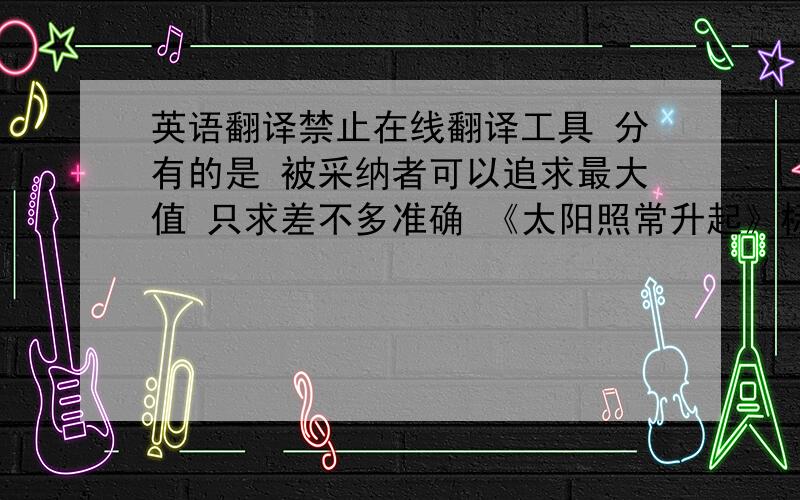英语翻译禁止在线翻译工具 分有的是 被采纳者可以追求最大值 只求差不多准确 《太阳照常升起》标志着海明威悲剧意识的形成.年轻的海明威从自己参战和旅居欧洲的经历,看到了战争的残
来源:学生作业帮助网 编辑:作业帮 时间:2024/11/05 11:43:03

英语翻译禁止在线翻译工具 分有的是 被采纳者可以追求最大值 只求差不多准确 《太阳照常升起》标志着海明威悲剧意识的形成.年轻的海明威从自己参战和旅居欧洲的经历,看到了战争的残
英语翻译
禁止在线翻译工具 分有的是 被采纳者可以追求最大值 只求差不多准确
《太阳照常升起》标志着海明威悲剧意识的形成.年轻的海明威从自己参战和旅居欧洲的经历,看到了战争的残酷和荒谬,也体会到了人生的悲剧本质.这一时期,他对悲剧的态度总体上是屈从和无奈接受的.但是,自然主义的宿命论不仅从文学的角度来说已经过时,而目作为一种人生观或世界观,与海明威的性格也格格不入.他注定要超越这一境界,事实上,他很快就做到了.从《太阳照常升起》到《永别了,武器》时间仅过了三年,但海明威完成了悲剧意识的一个重大转变.比起前部作品,《永别了,武器》 的悲剧色彩更为浓厚,而且,由于紧紧围绕战争与爱情两条主线,描写前者对后者的无情摧残和扼杀,小说的故事更加悲切感人.从这个意义上说,《太阳照常升起》和《永别了,武器》一脉相承,体现了海明威悲剧意识的延续性.但是,两部小说呈现出一个明显的变化:原有的宿命论倾向被自觉规避悲剧的意识所代替,小说人物也由麻木、空虚和无所事事的战后流亡者变成有意识逃避悲剧、追求个人幸福的战争直接体验者.
说了不要在线翻译 .很没意思好不 别浪费大家的时间
英语翻译禁止在线翻译工具 分有的是 被采纳者可以追求最大值 只求差不多准确 《太阳照常升起》标志着海明威悲剧意识的形成.年轻的海明威从自己参战和旅居欧洲的经历,看到了战争的残
"The Sun Also Rises," Hemingway's tragedy marked the formation of consciousness. Young Hemingway and war from our own experience of living in Europe, saw the cruelty and absurdity of war, but also experienced the tragedy of the nature of life. During this period, his attitude towards the tragedy of the whole, it is acceptable subordination and helplessness. However, the naturalistic fatalism, not only from a literary point of view is outdated, and the head as a life or world view, and also incompatible with the character of Ernest Hemingway. He is destined to go beyond the realm, in fact, he soon did. From "The Sun Also Rises" to "A Farewell to Arms" time after only three years,
Hemingway completed a tragedy but a major shift in consciousness. Compared to the previous works, "A Farewell to Arms," the tragedy of more intense color, and, as closely around the two main lines of war and love, describing the former to the latter and kill mercilessly destroyed, more mournful story of the novel moving. In this sense, "The Sun Also Rises" and "A Farewell to Arms" line, Ernest Hemingway embodies the sense of the continuity of the tragedy. However, the two novels show an obvious change: the original
Consciously to avoid the tendency to be fatalistic sense of tragedy replaced characters from numbness, emptiness and inactivity into exile after the war to avoid the tragedy of the conscious pursuit of personal well-being of those who experience the war directly.